
app-agent
AppAgent is an AI-first OSS alternative to App Radar, Sensor Tower, AppTweak, AppFollow, other ASO tools, built for developers who should focus on what really matters; build products.
Stars: 62
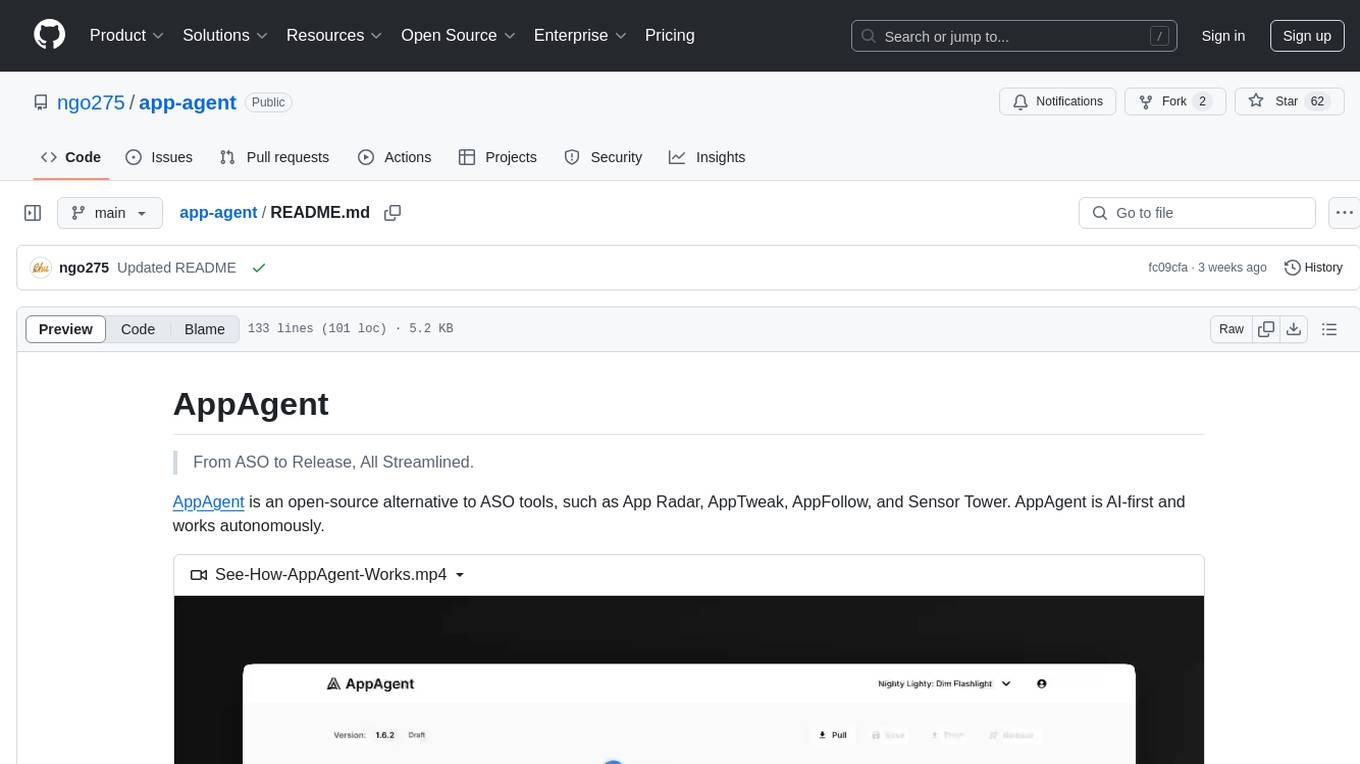
AppAgent is an open-source AI-first platform designed to streamline the app release process, from autonomous keyword research to ASO content generation. It offers features like autonomous keyword research, AI-powered store optimization, store synchronization with App Store Connect, and upcoming keyword tracking with self-healing. The tech stack includes Next.js, TypeScript, Tailwind CSS, Prisma ORM, PostgreSQL, NextAuth.js, PostHog, Resend, Stripe, and Vercel for hosting. Users can clone the repository, set up environment variables, install dependencies, set up the database, and run the development server to start using the tool.
README:
From ASO to Release, All Streamlined.
AppAgent is an open-source alternative to ASO tools, such as App Radar, AppTweak, AppFollow, and Sensor Tower. AppAgent is AI-first and works autonomously.
https://github.com/user-attachments/assets/e34baeef-ceab-4fdb-9a7c-e6a5ab80dbba
Thanks to rapid AI advancements, creating an app has never been easier. Yet popular ASO tools (App Radar, AppTweak, Sensor Tower, etc.) remain prohibitively expensive and unnecessarily complex for indie developers and small teams. What’s truly needed is a platform that autonomously handles everything—from multilingual keyword selection to ASO content generation—streamlining not just keywords, but the entire release process.
App Store Connect also introduced friction into the release workflow. That’s why I took an AI-first approach and built AppAgent from the ground up, reimagining how ASO and app releases should work together in one seamless, efficient platform.
-
Autonomous keyword research
- No more manual keyword hunting.
- Run autonomously, regardless of locales and markets.
-
AI-powered store optimization
- Instant suggestions based on your app's metadata.
- ASO friendly contents generation for all languages.
- No expert-level marketing needed, just click and go.
-
Store synchronization
- AppAgent read/write data to App Store Connect. Google Play is coming soon.
-
Keyword tracking + self-healing (Coming soon)
- Track your keywords and suggest edits without having you manually read charts.
- Next.js – Framework
- TypeScript – Language
- Tailwind – CSS
- shadcn/ui - UI Components
-
Prisma - ORM
- PostgreSQL - Database
- NextAuth.js – Authentication
- PostHog – Analytics
- Resend – Email
- Stripe – Payments
- Vercel – Hosting
git clone https://github.com/ngo275/app-agent.gitcp .env.sample .envHere's the list of environment variables you need to set:
-
NEXTAUTH_SECRET- A secret key for NextAuth.js. You can generate a random string using
openssl rand -base64 32.
- A secret key for NextAuth.js. You can generate a random string using
-
NEXTAUTH_URL- The URL of your app. For example,
http://localhost:3000.
- The URL of your app. For example,
-
NEXT_PUBLIC_BASE_URL- The URL of your app. For example,
http://localhost:3000.
- The URL of your app. For example,
-
NEXT_PUBLIC_MARKETING_URL- The URL of your marketing page. For example,
http://localhost:3000.
- The URL of your marketing page. For example,
-
GOOGLE_CLIENT_ID- The client ID of your Google OAuth application. Used for Google Login. Not necessary if you don't use Google Login.
-
GOOGLE_CLIENT_SECRET- The client secret of your Google OAuth application. Used for Google Login. Not necessary if you don't use Google Login.
-
RESEND_API_KEY- The API key of your Resend account. Used for sending emails.
-
NEXT_PUBLIC_POSTHOG_KEY- The key of your PostHog account. Used for analytics. Not necessary if you don't use PostHog.
-
OPENAI_API_KEY- The API key of your OpenAI account. Used for LLM usage.
-
UPSTASH_REDIS_REST_URL- The URL of your Upstash account. Used for caching.
-
UPSTASH_REDIS_REST_TOKEN- The token of your Upstash account. Used for caching.
-
NEXT_PUBLIC_FREE_PLAN_ENABLED- Whether the free plan is enabled. Set to
trueto enable the free plan.
- Whether the free plan is enabled. Set to
-
NEXT_PUBLIC_STRIPE_PUBLISHABLE_KEY- The publishable key of your Stripe account. Used for payments. If you set
NEXT_PUBLIC_FREE_PLAN_ENABLEDtotrue, this is not necessary.
- The publishable key of your Stripe account. Used for payments. If you set
-
STRIPE_SECRET_KEY- The secret key of your Stripe account. Used for payments. If you set
NEXT_PUBLIC_FREE_PLAN_ENABLEDtotrue, this is not necessary.
- The secret key of your Stripe account. Used for payments. If you set
-
STRIPE_WEBHOOK_SECRET- The webhook secret of your Stripe account. Used for webhooks. If you set
NEXT_PUBLIC_FREE_PLAN_ENABLEDtotrue, this is not necessary.
- The webhook secret of your Stripe account. Used for webhooks. If you set
-
STRIPE_PRO_PRICE_ID- The price ID of your Stripe Pro plan. Used for payments. If you set
NEXT_PUBLIC_FREE_PLAN_ENABLEDtotrue, this is not necessary.
- The price ID of your Stripe Pro plan. Used for payments. If you set
-
DATABASE_URL
yarn
# Or with NPM
npm installyarn prisma generate
yarn prisma migrate deploy
# Or with NPM
npm run prisma generate
npm run prisma migrate deployyarn dev
# Or with NPM
npm run devVisit http://localhost:3000 to see the app.
Contributions are welcome! Please feel free to submit a PR.
If you'd like to contribute, please fork the repository and submit a PR.
AppAgent is open-source under the GNU Affero General Public License Version 3 (AGPLv3) or any later version. You can find it here.
For Tasks:
Click tags to check more tools for each tasksFor Jobs:
Alternative AI tools for app-agent
Similar Open Source Tools

app-agent
AppAgent is an open-source AI-first platform designed to streamline the app release process, from autonomous keyword research to ASO content generation. It offers features like autonomous keyword research, AI-powered store optimization, store synchronization with App Store Connect, and upcoming keyword tracking with self-healing. The tech stack includes Next.js, TypeScript, Tailwind CSS, Prisma ORM, PostgreSQL, NextAuth.js, PostHog, Resend, Stripe, and Vercel for hosting. Users can clone the repository, set up environment variables, install dependencies, set up the database, and run the development server to start using the tool.
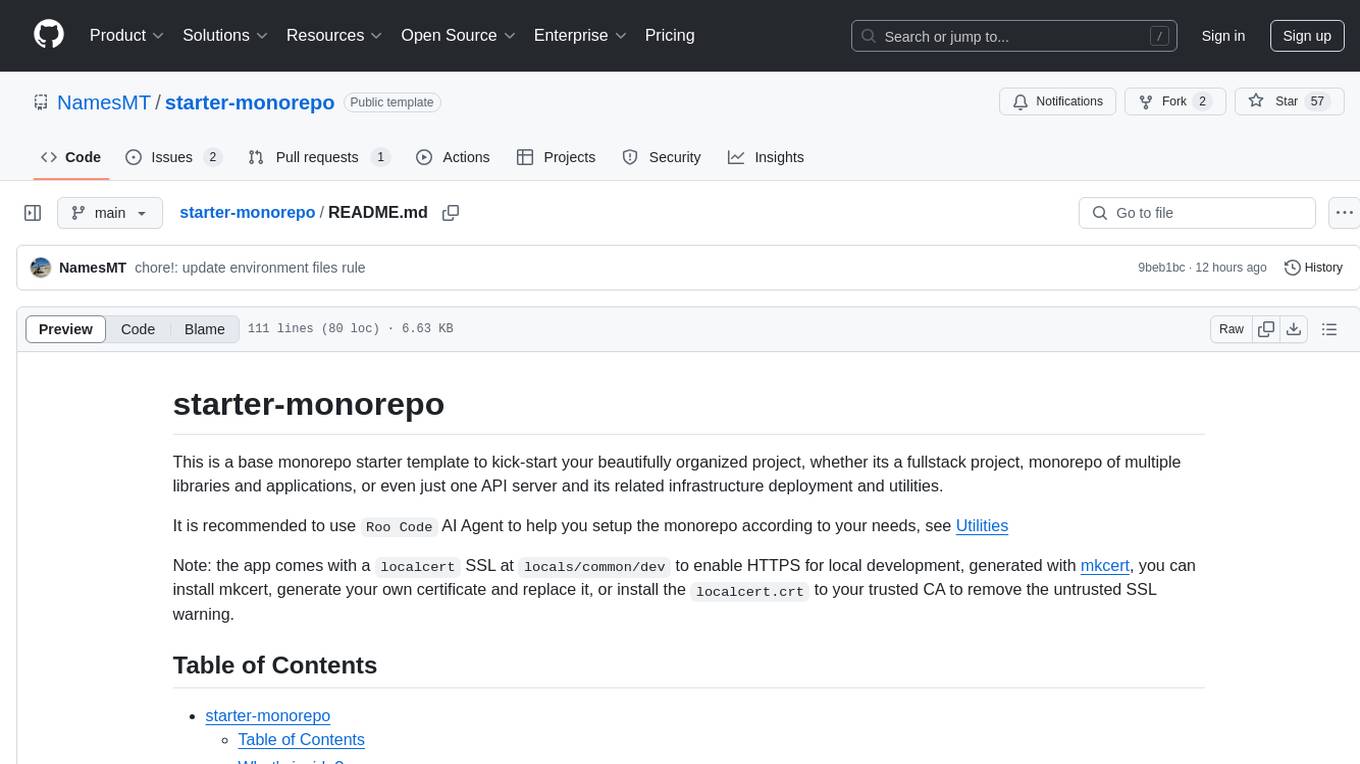
starter-monorepo
Starter Monorepo is a template repository for setting up a monorepo structure in your project. It provides a basic setup with configurations for managing multiple packages within a single repository. This template includes tools for package management, versioning, testing, and deployment. By using this template, you can streamline your development process, improve code sharing, and simplify dependency management across your project. Whether you are working on a small project or a large-scale application, Starter Monorepo can help you organize your codebase efficiently and enhance collaboration among team members.
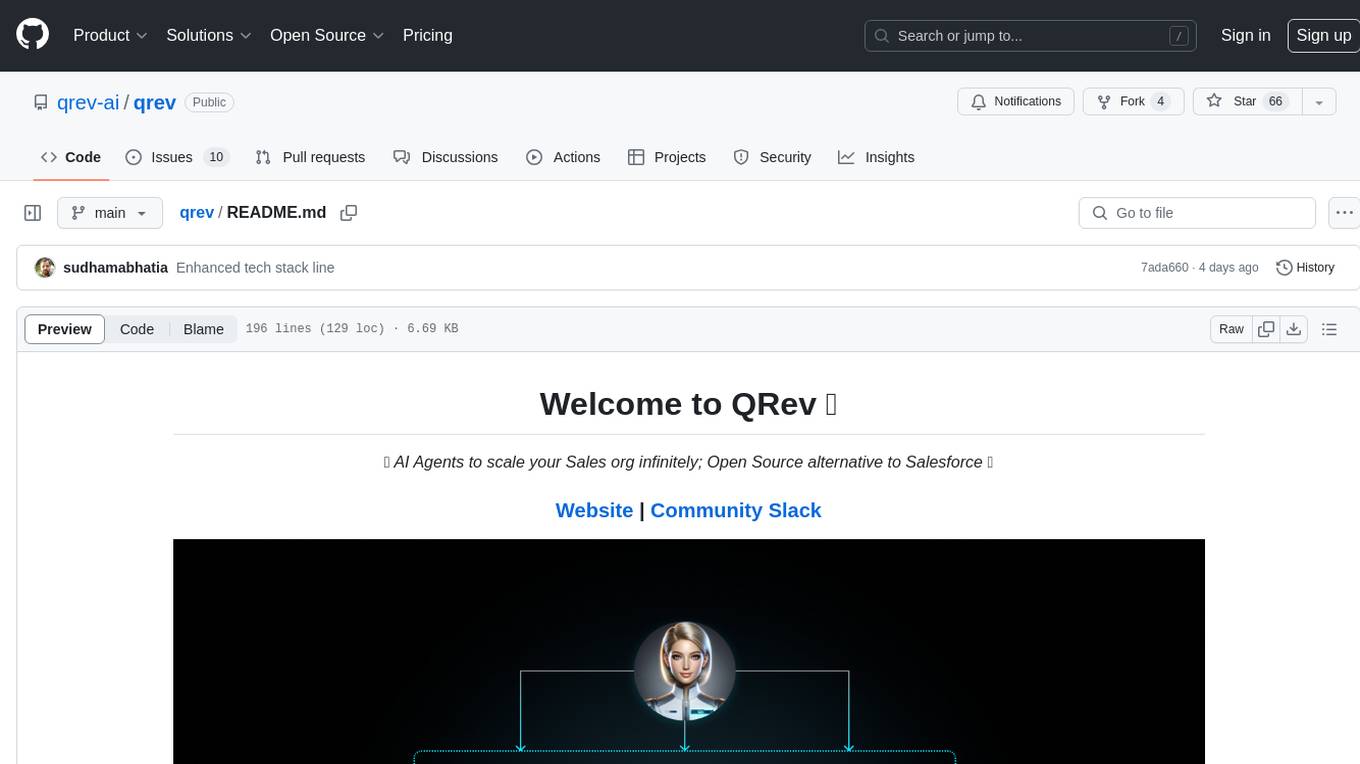
qrev
QRev is an open-source alternative to Salesforce, offering AI agents to scale sales organizations infinitely. It aims to provide digital workers for various sales roles or a superagent named Qai. The tech stack includes TypeScript for frontend, NodeJS for backend, MongoDB for app server database, ChromaDB for vector database, SQLite for AI server SQL relational database, and Langchain for LLM tooling. The tool allows users to run client app, app server, and AI server components. It requires Node.js and MongoDB to be installed, and provides detailed setup instructions in the README file.
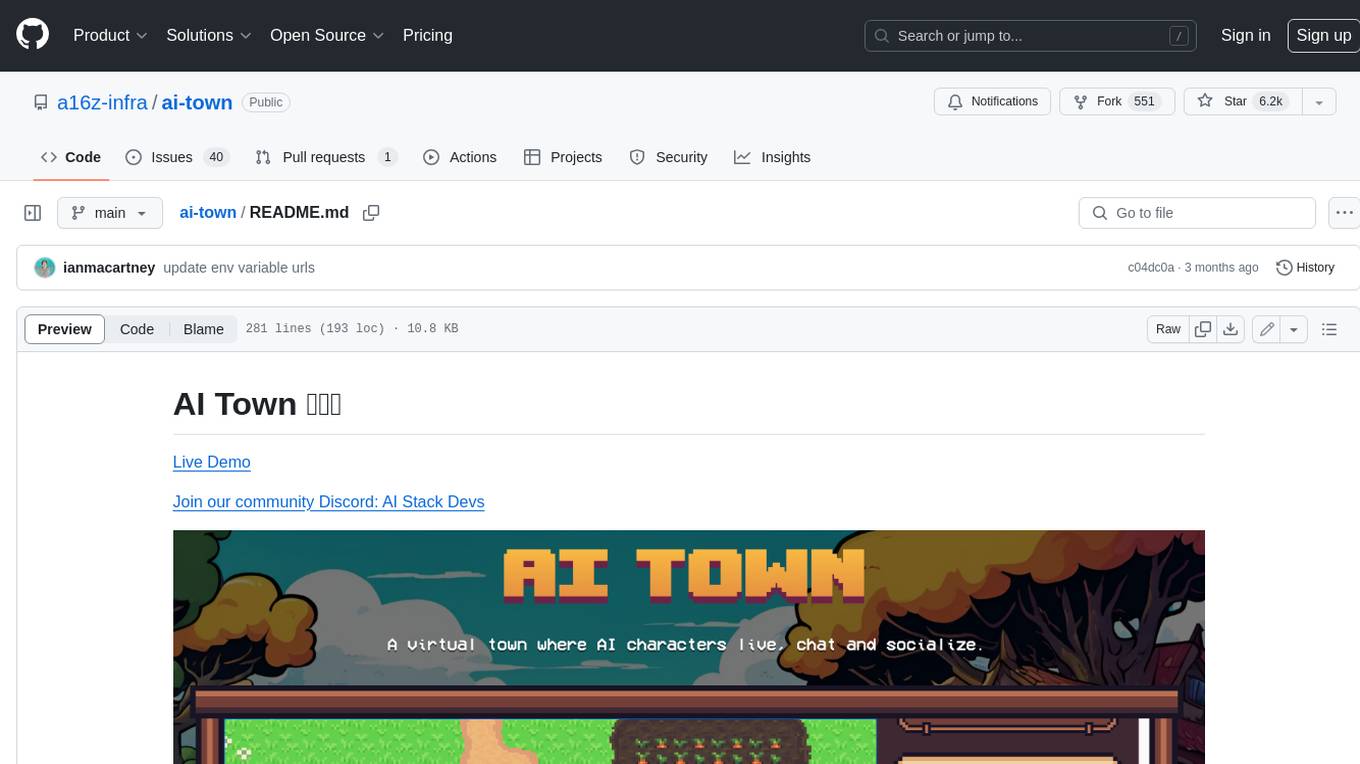
ai-town
AI Town is a virtual town where AI characters live, chat, and socialize. This project provides a deployable starter kit for building and customizing your own version of AI Town. It features a game engine, database, vector search, auth, text model, deployment, pixel art generation, background music generation, and local inference. You can customize your own simulation by creating characters and stories, updating spritesheets, changing the background, and modifying the background music.
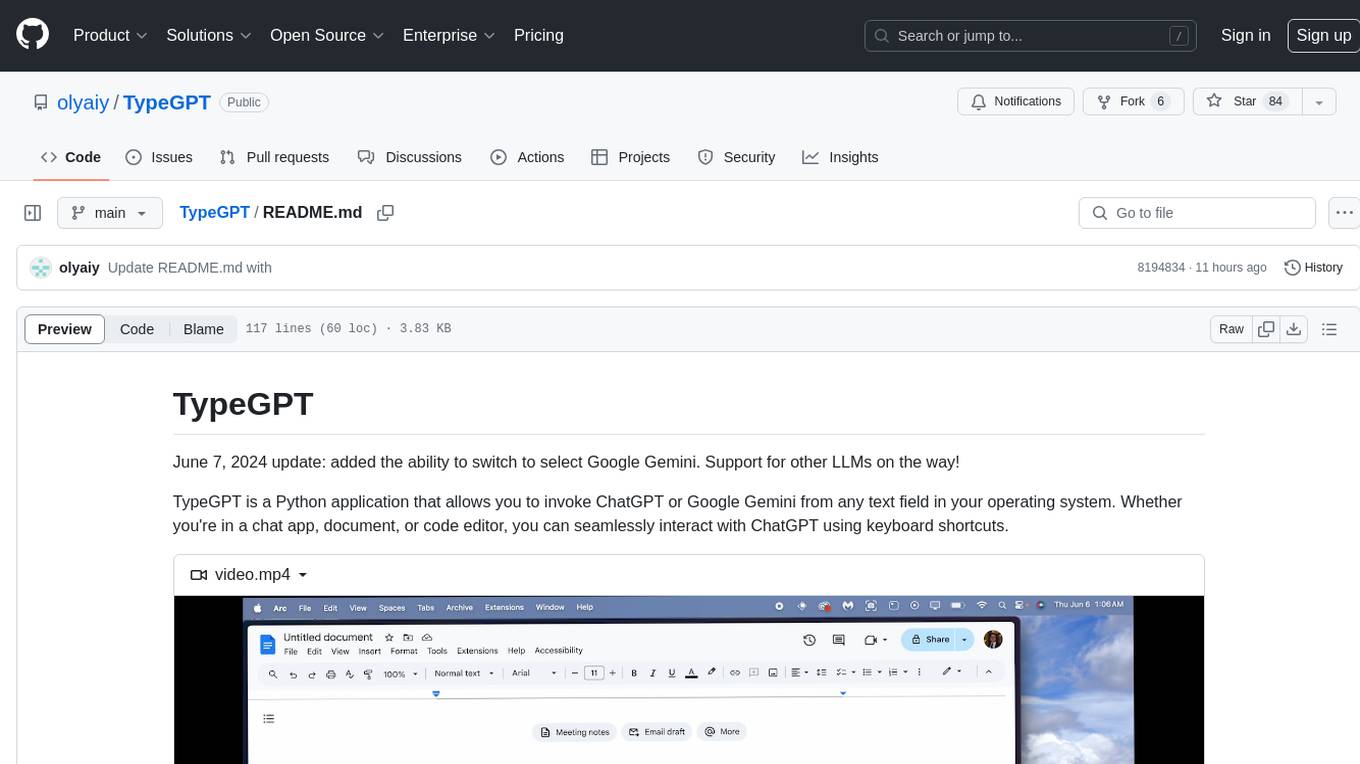
TypeGPT
TypeGPT is a Python application that enables users to interact with ChatGPT or Google Gemini from any text field in their operating system using keyboard shortcuts. It provides global accessibility, keyboard shortcuts for communication, and clipboard integration for larger text inputs. Users need to have Python 3.x installed along with specific packages and API keys from OpenAI for ChatGPT access. The tool allows users to run the program normally or in the background, manage processes, and stop the program. Users can use keyboard shortcuts like `/ask`, `/see`, `/stop`, `/chatgpt`, `/gemini`, `/check`, and `Shift + Cmd + Enter` to interact with the application in any text field. Customization options are available by modifying files like `keys.txt` and `system_prompt.txt`. Contributions are welcome, and future plans include adding support for other APIs and a user-friendly GUI.
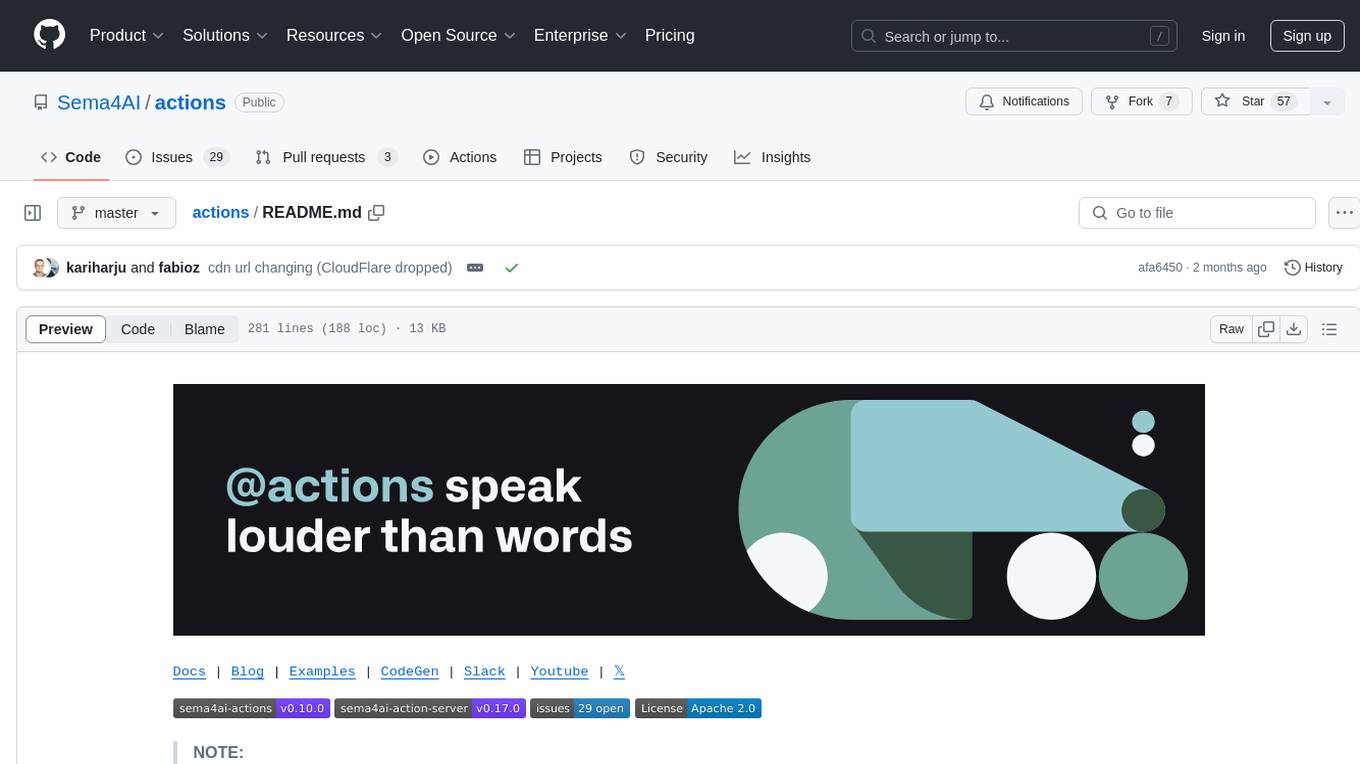
actions
Sema4.ai Action Server is a tool that allows users to build semantic actions in Python to connect AI agents with real-world applications. It enables users to create custom actions, skills, loaders, and plugins that securely connect any AI Assistant platform to data and applications. The tool automatically creates and exposes an API based on function declaration, type hints, and docstrings by adding '@action' to Python scripts. It provides an end-to-end stack supporting various connections between AI and user's apps and data, offering ease of use, security, and scalability.

agnai
Agnaistic is an AI roleplay chat tool that allows users to interact with personalized characters using their favorite AI services. It supports multiple AI services, persona schema formats, and features such as group conversations, user authentication, and memory/lore books. Agnaistic can be self-hosted or run using Docker, and it provides a range of customization options through its settings.json file. The tool is designed to be user-friendly and accessible, making it suitable for both casual users and developers.
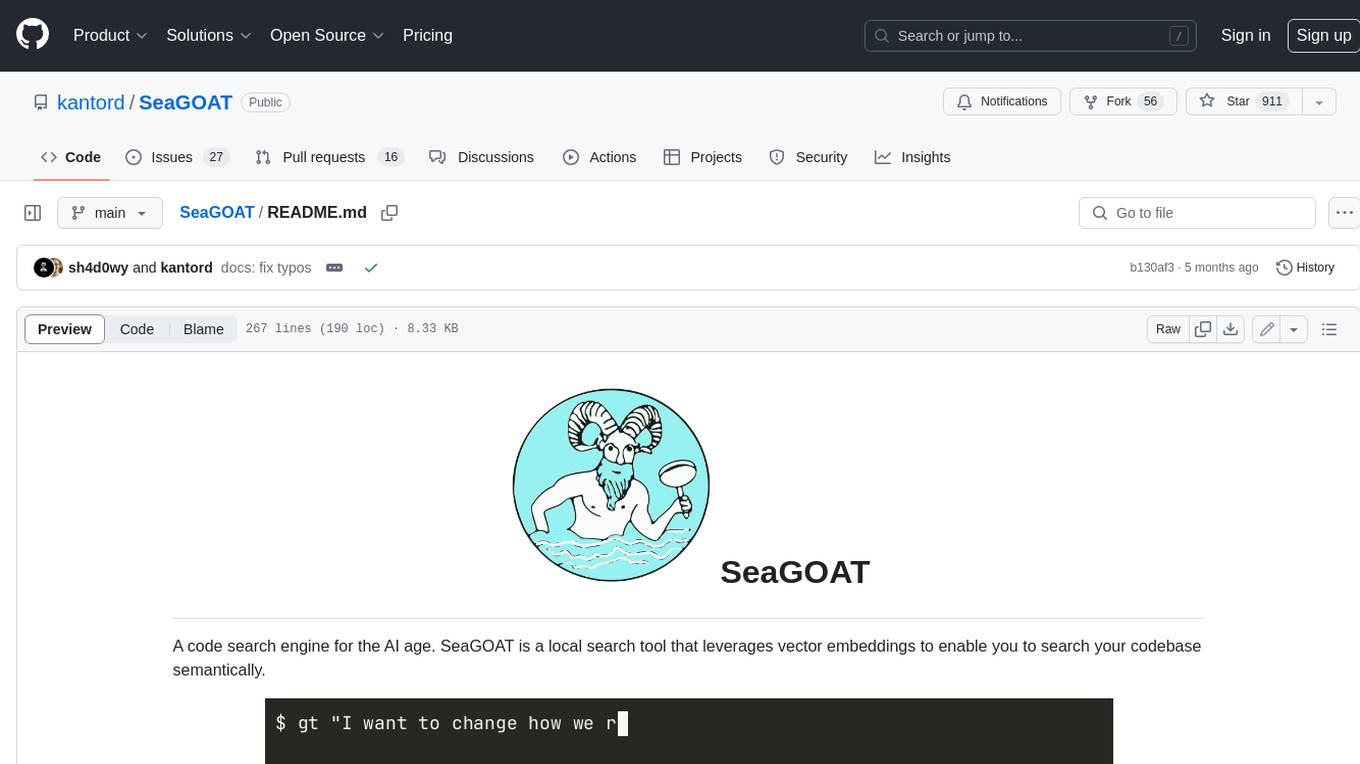
SeaGOAT
SeaGOAT is a local search tool that leverages vector embeddings to enable you to search your codebase semantically. It is designed to work on Linux, macOS, and Windows and can process files in various formats, including text, Markdown, Python, C, C++, TypeScript, JavaScript, HTML, Go, Java, PHP, and Ruby. SeaGOAT uses a vector database called ChromaDB and a local vector embedding engine to provide fast and accurate search results. It also supports regular expression/keyword-based matches. SeaGOAT is open-source and licensed under an open-source license, and users are welcome to examine the source code, raise concerns, or create pull requests to fix problems.
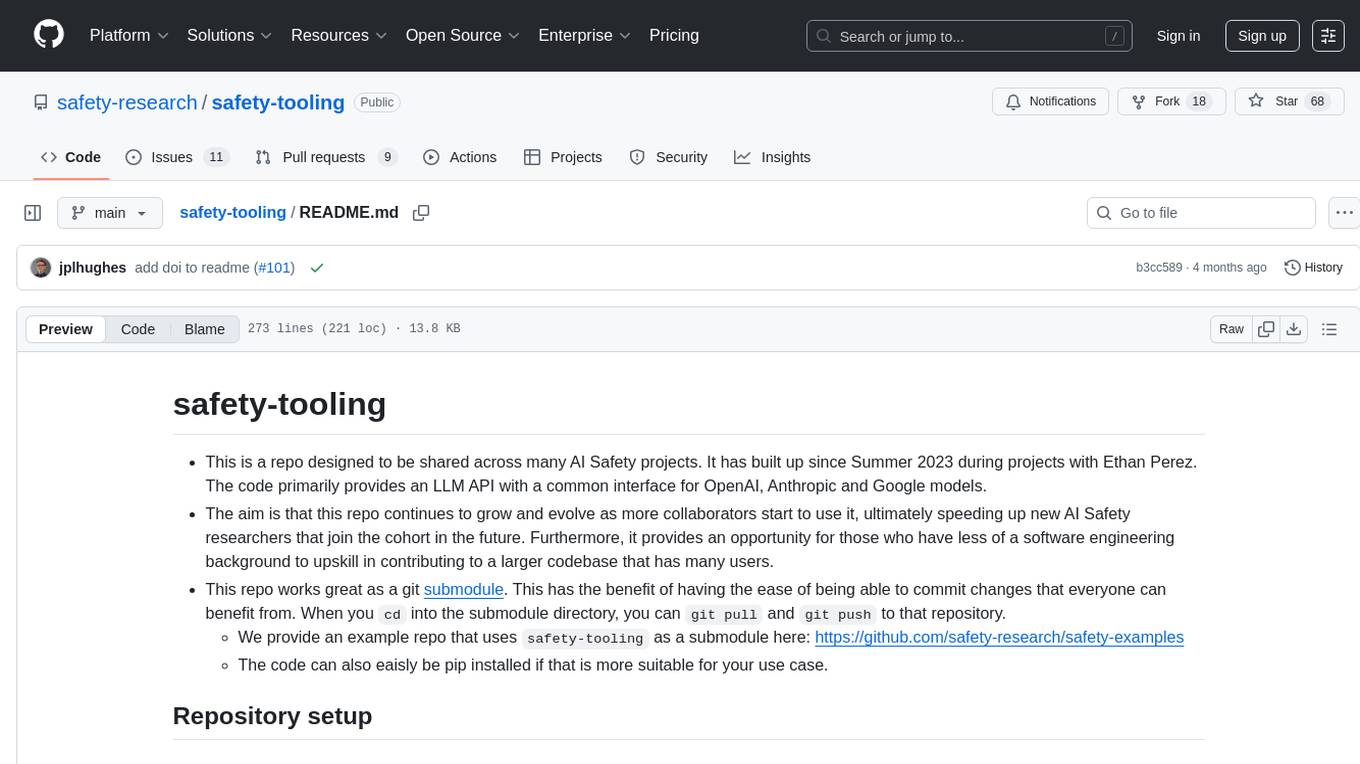
safety-tooling
This repository, safety-tooling, is designed to be shared across various AI Safety projects. It provides an LLM API with a common interface for OpenAI, Anthropic, and Google models. The aim is to facilitate collaboration among AI Safety researchers, especially those with limited software engineering backgrounds, by offering a platform for contributing to a larger codebase. The repo can be used as a git submodule for easy collaboration and updates. It also supports pip installation for convenience. The repository includes features for installation, secrets management, linting, formatting, Redis configuration, testing, dependency management, inference, finetuning, API usage tracking, and various utilities for data processing and experimentation.

robocorp
Robocorp is a platform that allows users to create, deploy, and operate Python automations and AI actions. It provides an easy way to extend the capabilities of AI agents, assistants, and copilots with custom actions written in Python. Users can create and deploy tools, skills, loaders, and plugins that securely connect any AI Assistant platform to their data and applications. The Robocorp Action Server makes Python scripts compatible with ChatGPT and LangChain by automatically creating and exposing an API based on function declaration, type hints, and docstrings. It simplifies the process of developing and deploying AI actions, enabling users to interact with AI frameworks effortlessly.
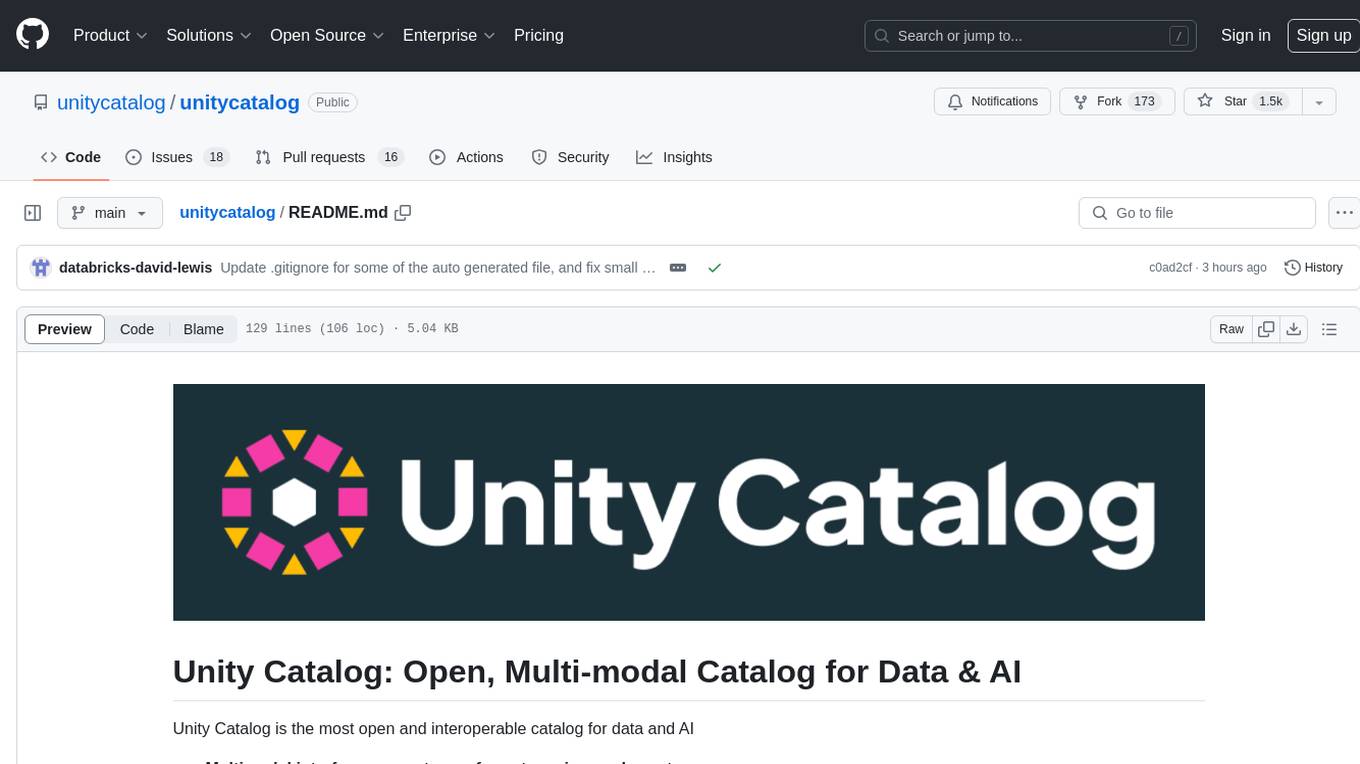
unitycatalog
Unity Catalog is an open and interoperable catalog for data and AI, supporting multi-format tables, unstructured data, and AI assets. It offers plugin support for extensibility and interoperates with Delta Sharing protocol. The catalog is fully open with OpenAPI spec and OSS implementation, providing unified governance for data and AI with asset-level access control enforced through REST APIs.
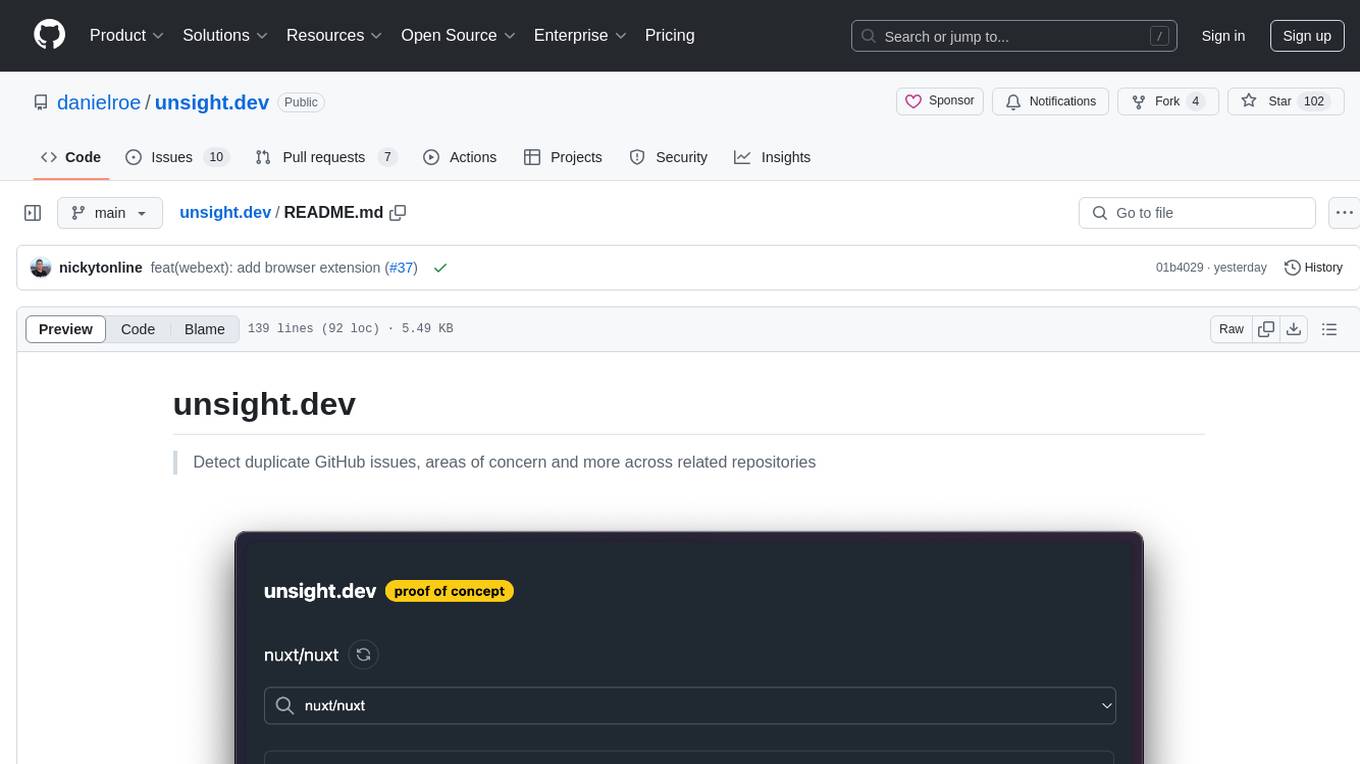
unsight.dev
unsight.dev is a tool built on Nuxt that helps detect duplicate GitHub issues and areas of concern across related repositories. It utilizes Nitro server API routes, GitHub API, and a GitHub App, along with UnoCSS. The tool is deployed on Cloudflare with NuxtHub, using Workers AI, Workers KV, and Vectorize. It also offers a browser extension soon to be released. Users can try the app locally for tweaking the UI and setting up a full development environment as a GitHub App.

termax
Termax is an LLM agent in your terminal that converts natural language to commands. It is featured by: - Personalized Experience: Optimize the command generation with RAG. - Various LLMs Support: OpenAI GPT, Anthropic Claude, Google Gemini, Mistral AI, and more. - Shell Extensions: Plugin with popular shells like `zsh`, `bash` and `fish`. - Cross Platform: Able to run on Windows, macOS, and Linux.

torchchat
torchchat is a codebase showcasing the ability to run large language models (LLMs) seamlessly. It allows running LLMs using Python in various environments such as desktop, server, iOS, and Android. The tool supports running models via PyTorch, chatting, generating text, running chat in the browser, and running models on desktop/server without Python. It also provides features like AOT Inductor for faster execution, running in C++ using the runner, and deploying and running on iOS and Android. The tool supports popular hardware and OS including Linux, Mac OS, Android, and iOS, with various data types and execution modes available.
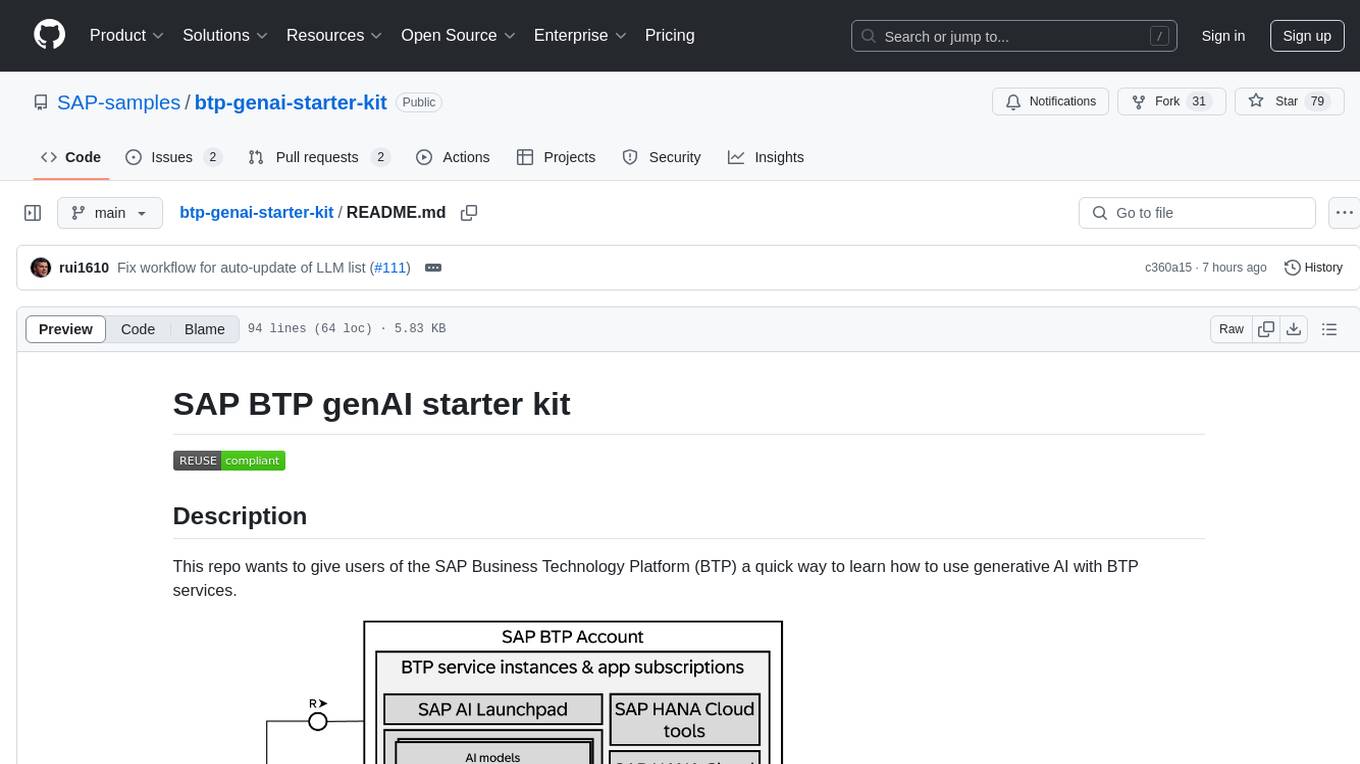
btp-genai-starter-kit
This repository provides a quick way for users of the SAP Business Technology Platform (BTP) to learn how to use generative AI with BTP services. It guides users through setting up the necessary infrastructure, deploying AI models, and running genAI experiments on SAP BTP. The repository includes scripts, examples, and instructions to help users get started with generative AI on the SAP BTP platform.
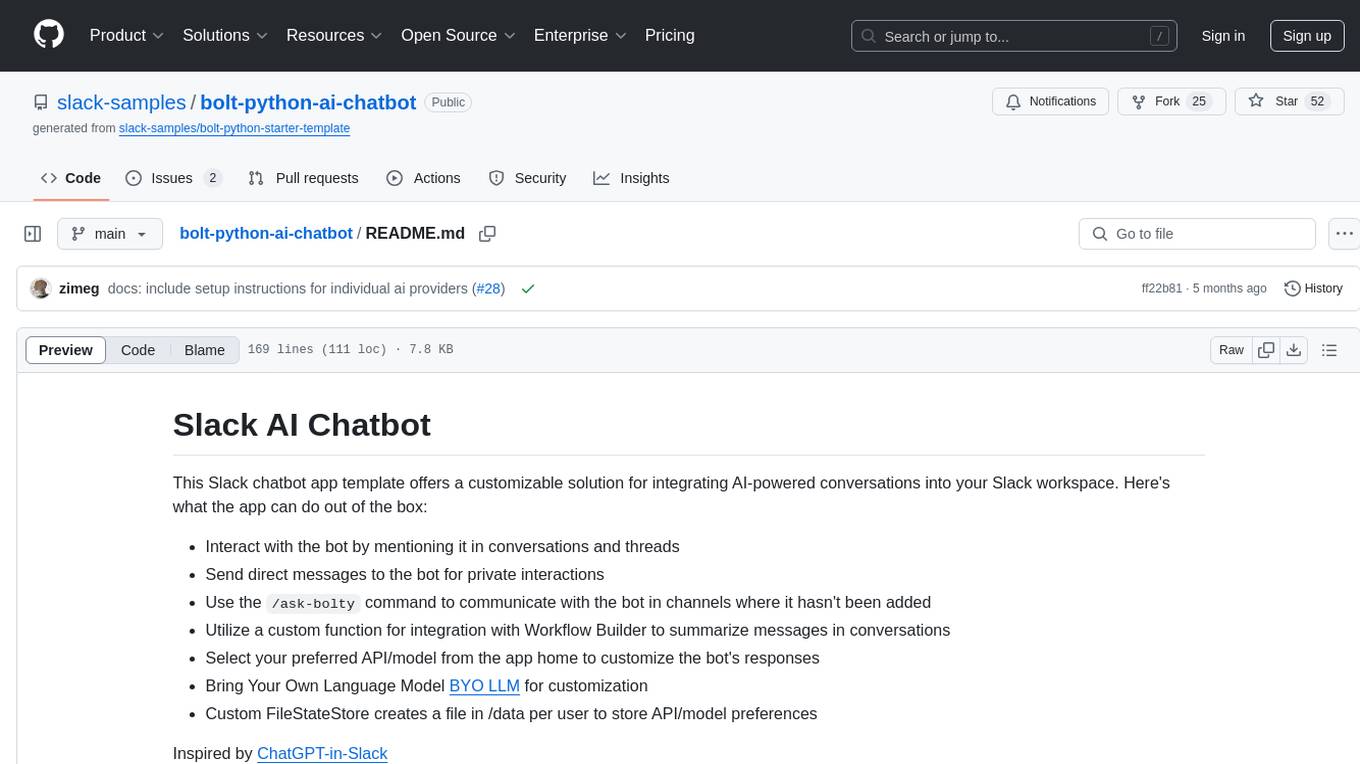
bolt-python-ai-chatbot
The 'bolt-python-ai-chatbot' is a Slack chatbot app template that allows users to integrate AI-powered conversations into their Slack workspace. Users can interact with the bot in conversations and threads, send direct messages for private interactions, use commands to communicate with the bot, customize bot responses, and store user preferences. The app supports integration with Workflow Builder, custom language models, and different AI providers like OpenAI, Anthropic, and Google Cloud Vertex AI. Users can create user objects, manage user states, and select from various AI models for communication.
For similar tasks

app-agent
AppAgent is an open-source AI-first platform designed to streamline the app release process, from autonomous keyword research to ASO content generation. It offers features like autonomous keyword research, AI-powered store optimization, store synchronization with App Store Connect, and upcoming keyword tracking with self-healing. The tech stack includes Next.js, TypeScript, Tailwind CSS, Prisma ORM, PostgreSQL, NextAuth.js, PostHog, Resend, Stripe, and Vercel for hosting. Users can clone the repository, set up environment variables, install dependencies, set up the database, and run the development server to start using the tool.
For similar jobs
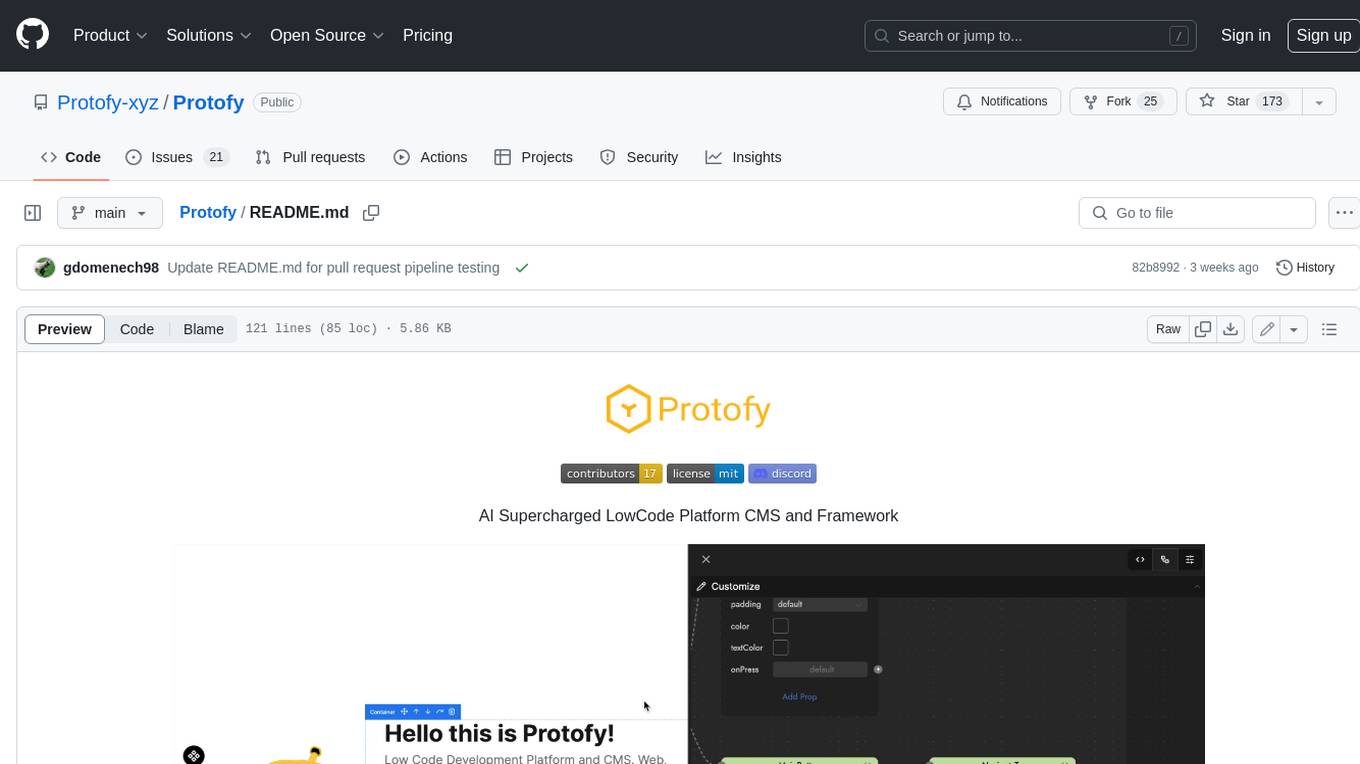
Protofy
Protofy is a full-stack, batteries-included low-code enabled web/app and IoT system with an API system and real-time messaging. It is based on Protofy (protoflow + visualui + protolib + protodevices) + Expo + Next.js + Tamagui + Solito + Express + Aedes + Redbird + Many other amazing packages. Protofy can be used to fast prototype Apps, webs, IoT systems, automations, or APIs. It is a ultra-extensible CMS with supercharged capabilities, mobile support, and IoT support (esp32 thanks to esphome).
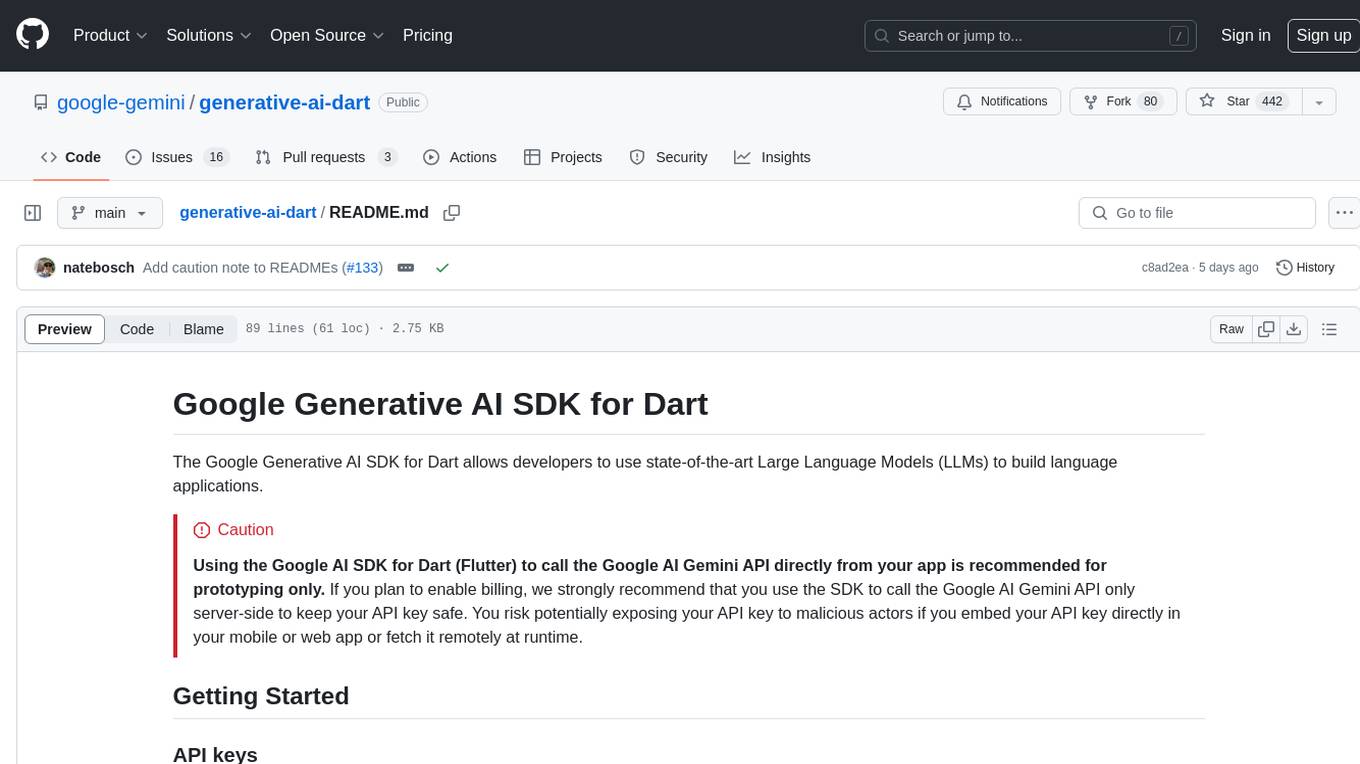
generative-ai-dart
The Google Generative AI SDK for Dart enables developers to utilize cutting-edge Large Language Models (LLMs) for creating language applications. It provides access to the Gemini API for generating content using state-of-the-art models. Developers can integrate the SDK into their Dart or Flutter applications to leverage powerful AI capabilities. It is recommended to use the SDK for server-side API calls to ensure the security of API keys and protect against potential key exposure in mobile or web apps.
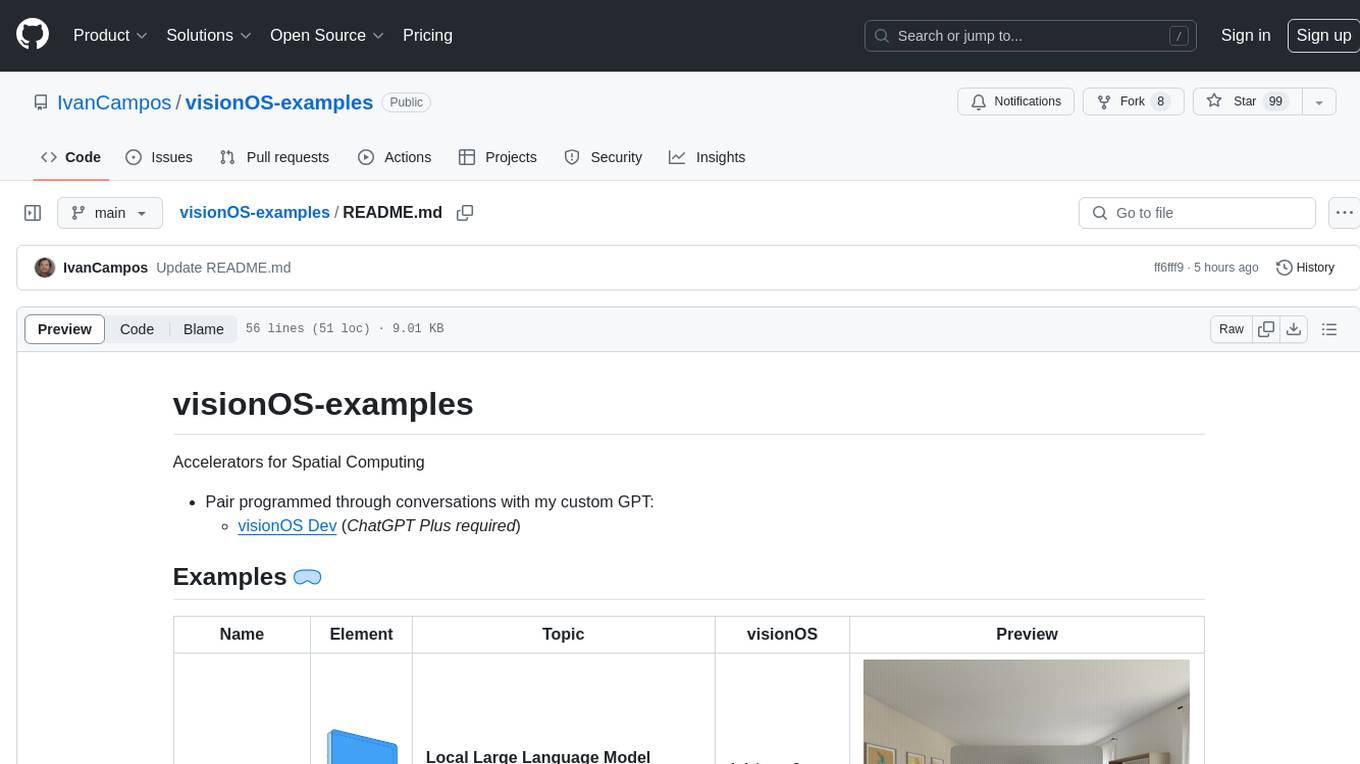
visionOS-examples
visionOS-examples is a repository containing accelerators for Spatial Computing. It includes examples such as Local Large Language Model, Chat Apple Vision Pro, WebSockets, Anchor To Head, Hand Tracking, Battery Life, Countdown, Plane Detection, Timer Vision, and PencilKit for visionOS. The repository showcases various functionalities and features for Apple Vision Pro, offering tools for developers to enhance their visionOS apps with capabilities like hand tracking, plane detection, and real-time cryptocurrency prices.
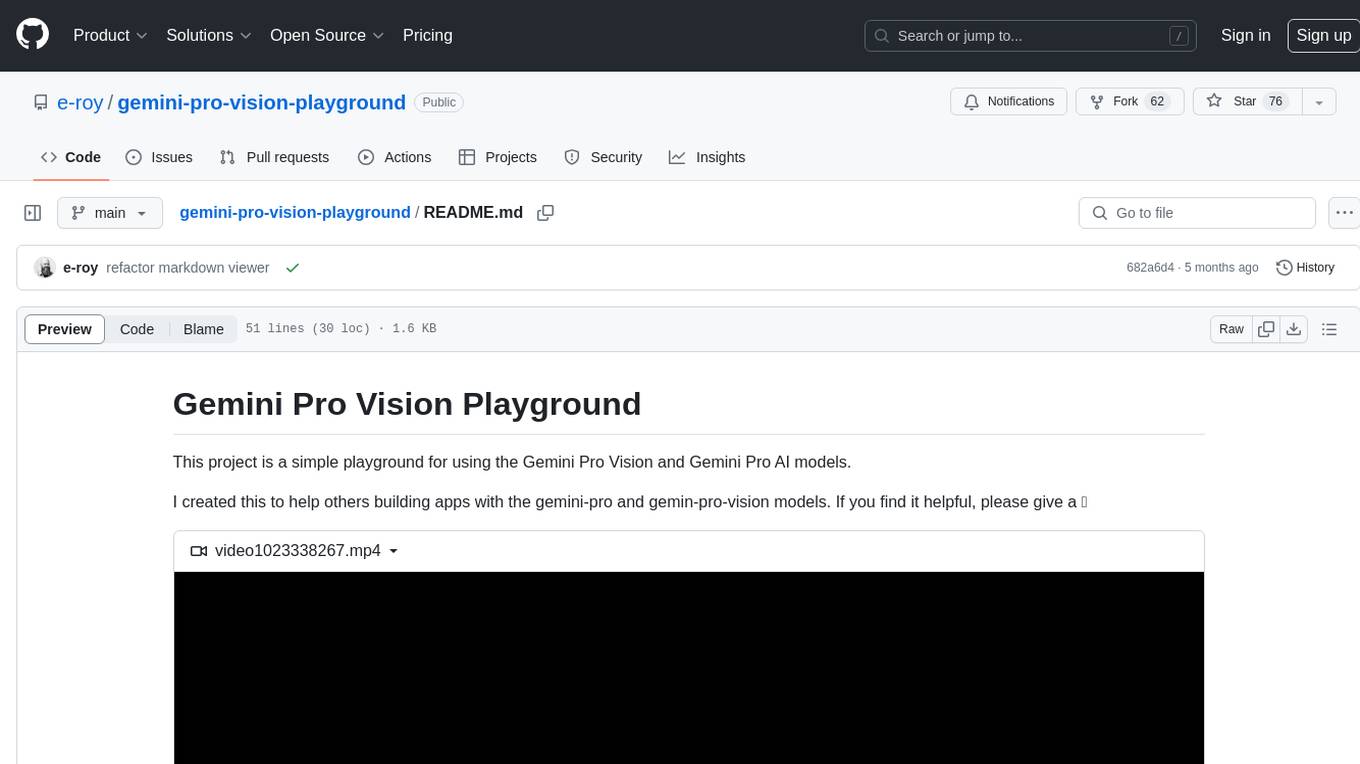
gemini-pro-vision-playground
Gemini Pro Vision Playground is a simple project aimed at assisting developers in utilizing the Gemini Pro Vision and Gemini Pro AI models for building applications. It provides a playground environment for experimenting with these models and integrating them into apps. The project includes instructions for setting up the Google AI API key and running the development server to visualize the results. Developers can learn more about the Gemini API documentation and Next.js framework through the provided resources. The project encourages contributions and feedback from the community.
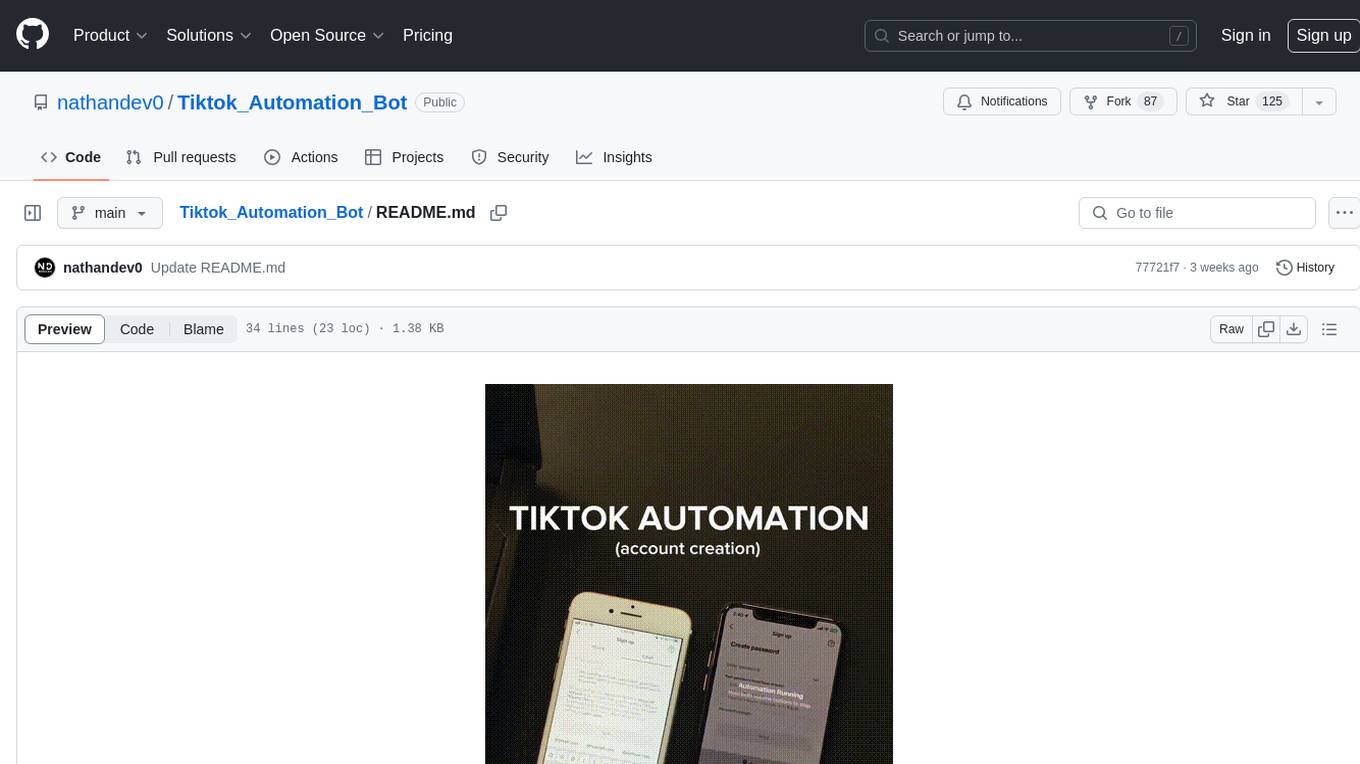
Tiktok_Automation_Bot
TikTok Automation Bot is an Appium-based tool for automating TikTok account creation and video posting on real devices. It offers functionalities such as automated account creation and video posting, along with integrations like Crane tweak, SMSActivate service, and IPQualityScore service. The tool also provides device and automation management system, anti-bot system for human behavior modeling, and IP rotation system for different IP addresses. It is designed to simplify the process of managing TikTok accounts and posting videos efficiently.
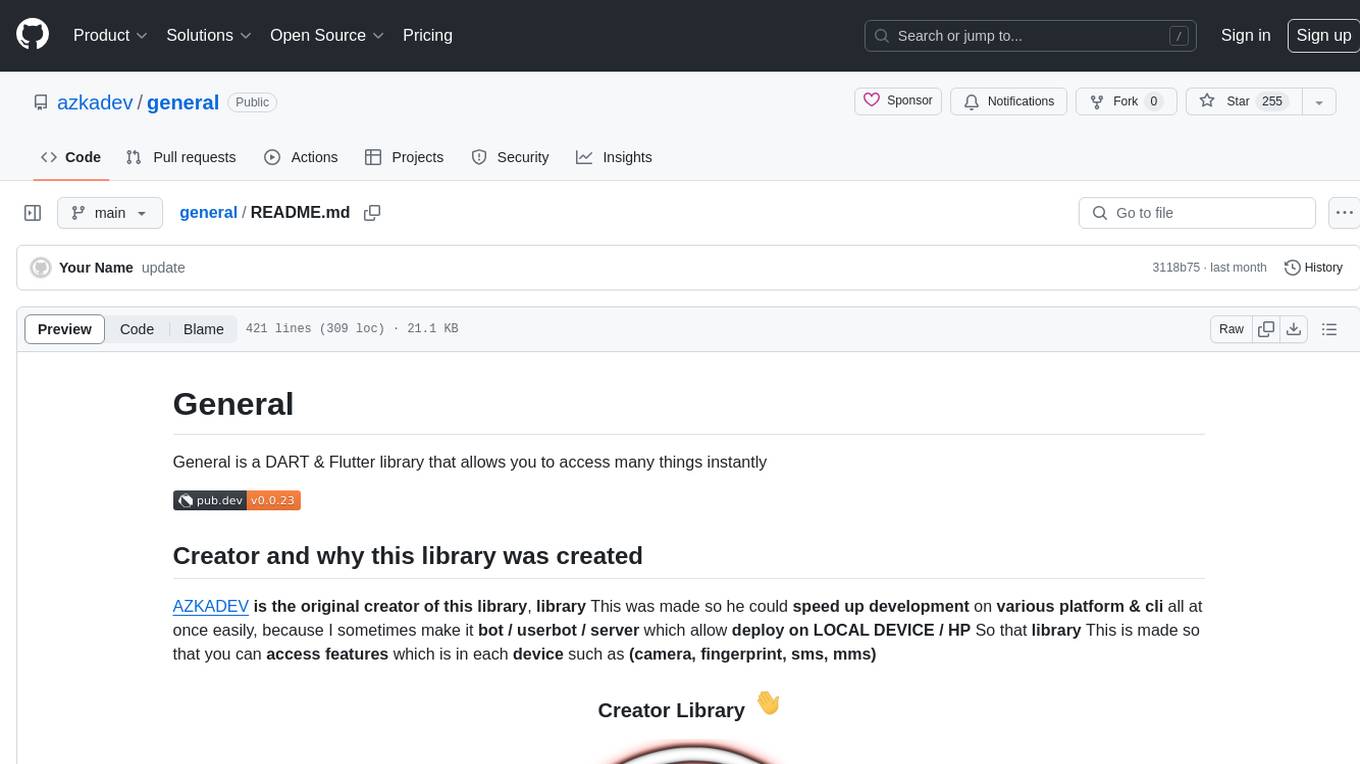
general
General is a DART & Flutter library created by AZKADEV to speed up development on various platforms and CLI easily. It allows access to features such as camera, fingerprint, SMS, and MMS. The library is designed for Dart language and provides functionalities for app background, text to speech, speech to text, and more.
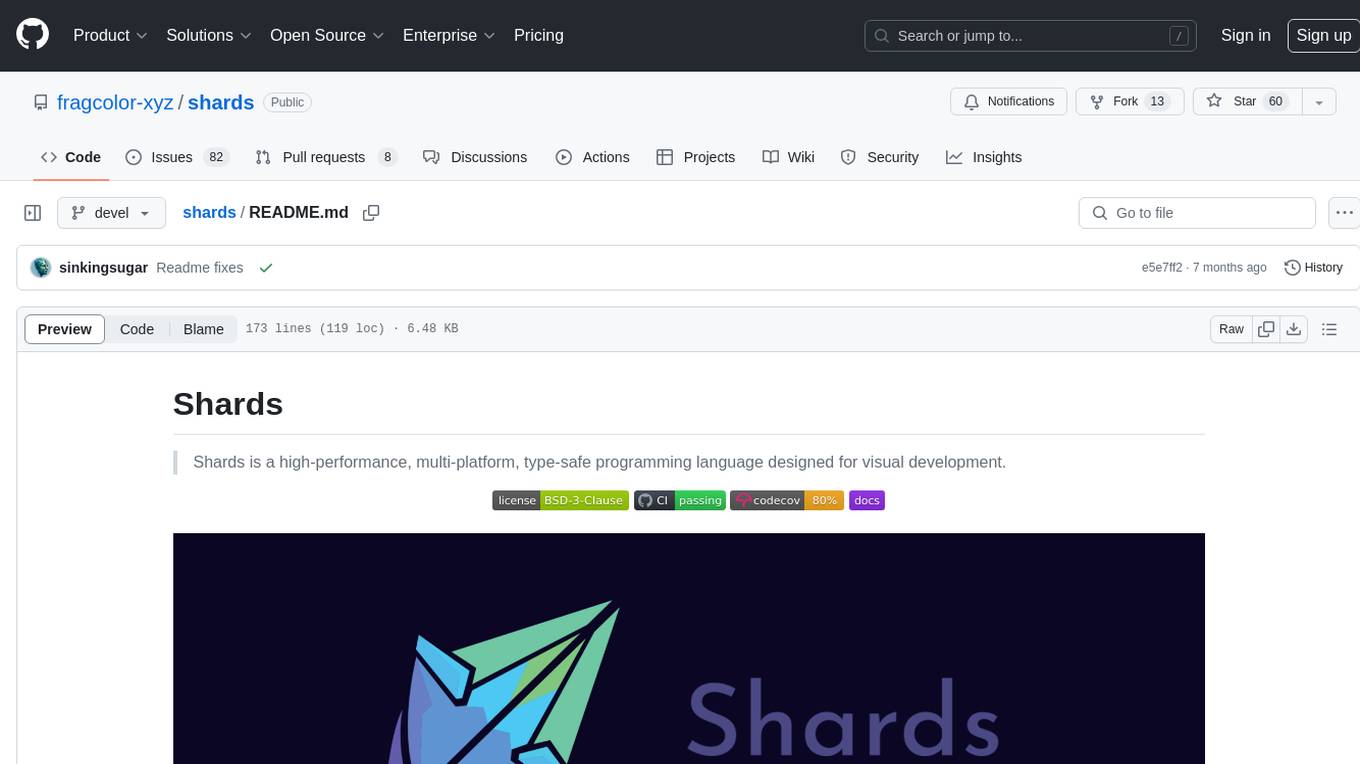
shards
Shards is a high-performance, multi-platform, type-safe programming language designed for visual development. It is a dataflow visual programming language that enables building full-fledged apps and games without traditional coding. Shards features automatic type checking, optimized shard implementations for high performance, and an intuitive visual workflow for beginners. The language allows seamless round-trip engineering between code and visual models, empowering users to create multi-platform apps easily. Shards also powers an upcoming AI-powered game creation system, enabling real-time collaboration and game development in a low to no-code environment.
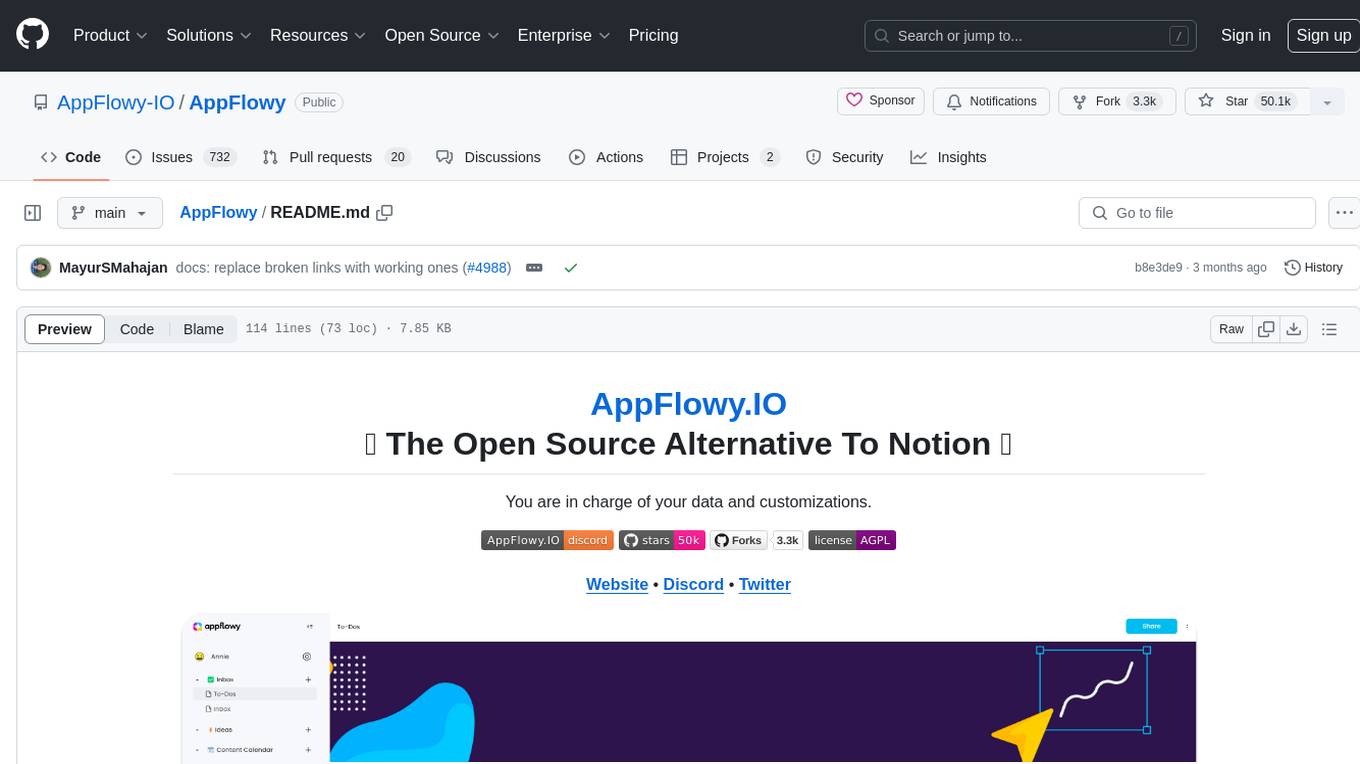
AppFlowy
AppFlowy.IO is an open-source alternative to Notion, providing users with control over their data and customizations. It aims to offer functionality, data security, and cross-platform native experience to individuals, as well as building blocks and collaboration infra services to enterprises and hackers. The tool is built with Flutter and Rust, supporting multiple platforms and emphasizing long-term maintainability. AppFlowy prioritizes data privacy, reliable native experience, and community-driven extensibility, aiming to democratize the creation of complex workplace management tools.